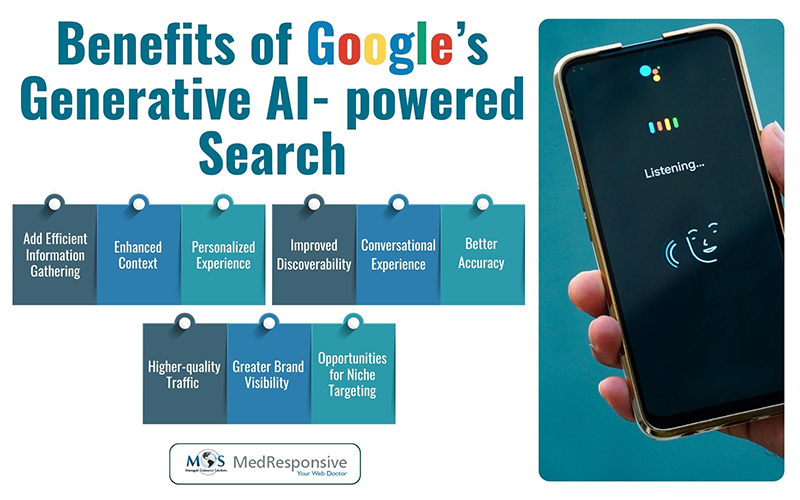Google has a long history of redefining how we search for and interact with information. Google Generative Search is at the forefront of this transformation. Google Search AI integration along with cutting-edge natural language processing generates more intelligent, comprehensive, conversational, and contextual results. For users, it feels like interacting with an informed assistant rather than just retrieving a list of links. Compared to conventional search, which primarily displays links, Google Generative Search aims to give users a deeper, context-rich answer that captures relevant information quickly and accurately. This helps users discover and understand topics more efficiently without manually sifting through multiple sources. For businesses and content creators, it means rethinking SEO strategies – especially with the rise of AI SEO services tailored for this new search experience. In this post, we explore what Google Generative Search is, how it works, the benefits of Google’s AI-powered search, and how it compares to traditional search methods.
What Is Google Generative Search?
In simple terms, Google Generative Search leverages artificial intelligence to go beyond keyword matching. Instead of simply providing a ranked list of web pages, it generates concise, contextually rich answers to user queries, often pulling from multiple sources. The technology is powered by Google’s advancements in generative AI, enabling the search engine to “understand” user intent more deeply. This means you can ask complex, multi-layered questions, and the search results will provide combined insights rather than forcing you to join together information from multiple sites.
Google Generative Search versus Traditional Search – Key Differences
Both generative search and traditional search are methods of finding information, but they differ in their workings and output. Here are the key differences:
Traditional Search
Conventional search is based on your search query, Google retrieves links to relevant websites that might hold answers to your query. This shows you a list of web pages that are most relevant to your query. You need to individually visit the websites to gather information particular to your search. In addition, this type of search offers minimal interaction beyond basic speech refinements and is not flexible enough to answer long conversational queries.
Google Generative Search
This type of search focuses on AI-generated text summaries where you can get a summarization of the major points. With this search, you get a concise answer or summary of information directly on the search results page, along with relevant links for further exploration. It involves increased interaction, offering features like asking follow-up questions within the SGE interface for further clarification or deeper dives.
Benefits of Google’s Generative AI- powered Search
The key benefits of Google’s AI-powered search extend to both users and content creators:
- Efficient Information Gathering: Users receive well-rounded answers without navigating multiple websites, which simplifies the search process. You don’t need to click through multiple sites; you get the summary right away.
- Enhanced Context: It delivers contextually rich responses, which can provide insights and answer complex questions more effectively. Follow-up questions refine results without starting from scratch.
- Personalized Experience: Through machine learning, Generative Search personalizes responses to meet user needs, understanding nuances within queries.
- Improved Discoverability: Google SGE (search generative experience) helps highlight lesser-known information or resources by analyzing and synthesizing varied sources into cohesive responses.
- Conversational Experience: Queries feel like asking an expert rather than typing into a static search bar.
- Better Accuracy: AI synthesizes credible sources to deliver fact-checked and reliable responses.
- Higher-quality Traffic – Users clicking through are more likely to be genuinely interested, as they have already previewed content in AI summaries.
- Greater Brand Visibility – Well-optimized content has a chance to be featured directly in AI-generated responses.
- Opportunities for Niche Targeting – With AI SEO services, brands can tailor strategies to match the nuanced queries AI search now handles.
Quick Stats: Google Generative Search by the Numbers
- 13.14% of all Google searches now feature AI Overviews — up from just 6.49% in January 2025. SEMRush – Google Search Statistics (March 2025).
- Zero-click searches in the U.S. account for 27.2% of queries, rising sharply from last year, while nearly 60% of searches globally ended without a click in 2024. AboutChromebooks – Google Search Statistics 2025.
- Informational searches trigger AI Overviews 88.1% of the time—showing how SGE is catering to knowledge-focused queries. AboutChromebooks – Google Search Statistics 2025.
- Circle to Search is live on 200 million Android devices and influences 10% of their searches. SEMRush – Google Search Statistics (2025).
- Visual searches with Google Lens have soared by 5 billion since late 2024, with a 10%+ increase in shopping-related queries in early 2025. JustThink.AI – Google AI Search Growth (2025)
- AI Overviews now serve over 1.5 billion users per month in 100+ countries—nearly 40% of global internet users. JustThink.AI – Google AI Search Growth (2025).
- Despite AI’s rise, Google still controls nearly 90% of global search market share, although some analysts account for AI alternatives and estimate an effective 65–70%. Reuters Google AI Upgrades at I/O 2025, Wall Street Journal – AI’s Threat to Google.
How is Generative AI Search Revolutionizing SEO?
Generative AI search is changing the SEO landscape by shifting the focus from traditional keyword-based search rankings to content quality, relevance, and user intent. In a generative AI-powered search experience like Google SGE, search engines aim to understand and generate responses to queries rather than simply listing web pages based on keywords. This transformation could influence how SEO is approached in several key ways:
- Emphasis on Content Quality and Depth: With generative AI, search engines prioritize content that answers questions comprehensively. SEO will likely need to focus more on creating in-depth, valuable content that satisfies various aspects of a query.
- Shifting Focus from Keywords to User Intent: Traditionally, SEO is all about optimizing content for specific keywords. Gradually, realizing the user’s intent, Generative AI-powered search started prioritizing understanding the user’s intent behind the search. While SEO is in the phase of adapting, in SGE, content that addresses a user’s search query, even if it does not contain the exact keywords, becomes crucial to ranking well.
- Contextual and Conversational Relevance: Generative AI emphasizes context and intent over single keywords. This means that content optimized for context and user intent, rather than keyword stuffing, will likely perform better. Answering complex questions, using long-tail keywords, and creating topic clusters will become more crucial.
- Less Focus on Traffic, More on Visibility: As Google SGE generates answers within search results, users may not need to click through to individual sites as often. SEO will have to adapt by focusing more on brand visibility, authority, and ensuring content appears within these AI-generated answers.
- Increased Demand for Authority and Credibility: Generative AI tools are more likely to pull information from authoritative, credible sources. Establishing domain authority and building trust through credible content, expert quotes, and reputable sources will be essential to securing a spot in AI-generated responses.
- Focus on Earning Backlinks: Backlinks, where other websites link to yours, remain a strong SEO signal. Earning backlinks from high-quality, relevant websites can still improve your website’s authority and potentially influence how SGE perceives your content.
- New Opportunities for Content Marketing: SGE provides opportunities for new content marketing strategies. It help create strong, high-quality content that successfully anticipates user questions and provides comprehensive answers, which can position your website as a valuable resource for SGE to draw on.
The SEO Impact in Numbers: Generative Search by the Stats
| Insight | Statistic |
|---|---|
| User Reach & Impressions | 2 billion users/month for AI Overviews → 49% more impressions, 12% search revenue boost ($54.2 B) The Wall Street Journal |
| Plummeting Click-Through Rates | CTR drops to <1%, compared to >15% previously; average declines of 15.5%, top pages see up to 34.5% drop Simplilearn.comExposure Ninja |
| Insight | Statistic |
|---|---|
| Publisher Traffic Losses | Major news sites: Forbes/HuffPost –40%, DailyMail –32%, CNN –28%, WSJ –17% New York Post |
| Zero-Click Prevalence | U.S. click-through with AI Overviews: 23% vs. 36% Barron’s; zero-click searches: 58.5% (US), 59.7% (Europe) Reddit |
| SGE Visibility | 86.8% of queries show SGE; only 4.5% of URLs from Page 1 appear in SGE; #1 result is pushed down ~1.6× viewport SEO.AI |
| Strategy Shift to AEO | 20–40% organic traffic losses expected for brands not adopting AEO by 2026 Wikipedia |
Google Generative Search is transforming search into an intuitive, conversational, and highly personalized experience. Its reliance on Google Search AI integration means results are no longer just a list of links. Rather, they are context-rich insights tailored to the user’s intent. Optimizing for AI-powered search results and leveraging AI SEO services will be key to maintaining visibility and authority in the digital space. As the comparison of Google Generative Search versus traditional search shows, the future of search is more than just finding information – it’s about understanding, synthesizing, and delivering it in a way that is both efficient and engaging.
Stay ahead in the AI search era
Learn how to adapt your content for Google Generative Search now!





